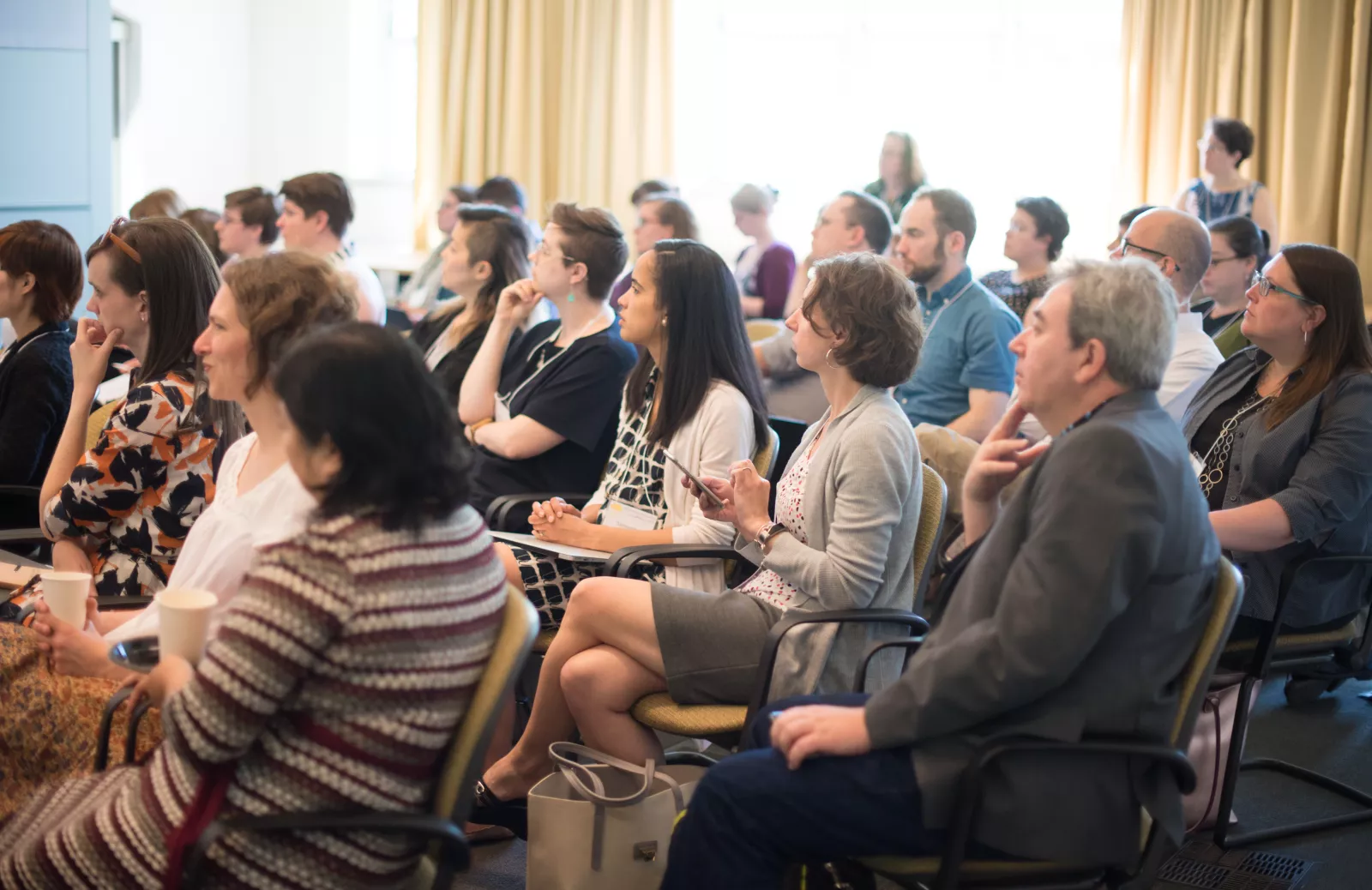
Thank you to all those who attended the Blended Learning Conference 2018! This year, we solicited proposals that focused on process as well as product, gave hands-on practical advice and implementation tips, and/or showed methods and techniques over time. As always, the conference represented various disciplines and roles, all brought together by a shared interest in technology and pedagogy.
You can view all session descriptions here.
Highlights and Themes
It's hard to make generalizations about any event like this one (as one of the organizing team members noted on Twitter: "I've gone from talking about memes to talking about Soviet cultures and digitizing libraries"). But there were some broad themes that emerged for us over the course of the two-day event.
I know I'm technically a part of the #BlendLAC18 conference team, but I'm so impressed with the diversity of session topics this year! Especially since I've gone from talking about memes to talking about Soviet cultures and digitizing libraries.
— PB (@pbhandari2016) May 23, 2018
Repurposed Technology
We saw several presentations this year showcasing unexpected, creative, and unintended technology use. The Twitter conversation kicked off early with a discussion from Nicholas Koberstein (Keuka College) and Brian Moritz (SUNY Oswego) on "Meme Wars" as a way to maintain student interest during the late-semester slump.
Student motivation falling in the "3rd Unit Crisis"? Catch this limited time offer to learn about #kcmemewars #moritzmemewar at #BlendLAC18! #SlapOnSomeMemeWars
— Nicholas Koberstein (@Prof_Koberstein) May 23, 2018
@BlendLAC @KeukaCollege @bpmoritz pic.twitter.com/b0WL3rv87Q
An interest in creative tech use to support student learning was also readily apparent in our hands-on workshops, which covered drones, screencasting for student collaboration (rather than exclusively for faculty lectures), and using the Digital Public Library of America for student-centered pedagogy.
At Blended Learning in the Liberal Arts” mtg at @BrynMawrCollege. Anne & Will Marchant #innovate by teaching use of drones to get aid into disaster sites! #BlendLAC18 pic.twitter.com/YRT9l1ms6m
— Bob Morris (@drbobmorris) May 23, 2018
This year we also mixed up our session formats a bit more than we have in the past, with a new panel of 5-minute lightning rounds and "The Stat is Right," a gameshow-style panel exploring the sometimes unexpected data about student and faculty use technology.
Getting ready for a very interactive presentation: "The Stat is Right! The Ed Tech Quiz Show." #BlendLAC18 pic.twitter.com/6ojuYw7YVP
— BMC Blended Learning (@BlendedLAC) May 24, 2018
Programmatic Innovation
Several sessions this year gave participants the opportunity to reflect not just on technologies but also on the process of creating and maintaining digitally-oriented programs. Speakers on professional development, digital pedagogy within consortia, and similar topics lead to frequent conversations about project management, accountability, and sustainability.
Some formal project mgmt from the get go is key to successful sustained multi-campus collab #LVAIC #BlendLAC18 pic.twitter.com/YO6IT6M6TL
— TheLACOL (@TheLACOL) May 24, 2018
The conference also reminded us that digital work also exists outside of planned and institutional boundaries--while our conference focused on faculty and staff, there were frequent reminders that students are often the drivers, as well as the creators, of digital programming.
Second time (in two sessions) we're hearing about students wanting to join faculty-targeted digital pedagogy workshops. Hmm! #BlendLAC18
— Beth Seltzer (@beth_seltzer) May 23, 2018
Along the way, we encountered some sobering data about how technology decisions impact the lives of students. In a presentation on OER resources, Amy Sugar from Rollins College reported the results of a student survey asking how students would spend the money they saved on textbooks--and the top answers (food, health, transportation) shows that technology decisions can have a broad-ranging impact on a student's quality of life.
When asked how they'd spend the money they saved on #oer textbooks, students @rollinscollege overwhelming said "food," "health," "transportation" etc. NOT clothes or entertainment. #BlendLAC18
— Beth Seltzer (@beth_seltzer) May 23, 2018
The Future of Programming
A highlight of the conference was the thought-provoking keynote from Randy Bass, Vice Provost for Education and Founding Executive Director of the Center for New Designs in Learning and Scholarship at Georgetown University. Bass spoke on "What Should We Ask of the Liberal Arts in a Dis-integrative Era?" Bass argued that higher ed needs to be aimed at helping humans become better at being human.
THE project of liberal education #RandyBass #BlendLAC18 pic.twitter.com/co6vwkyaaI
— TheLACOL (@TheLACOL) May 24, 2018
To serve this goal, Bass proposes a "rebundled" version of education, which puts the "unbundled" Silicon Valley model of microcredentials and competency-based education into the service of a "bundled," Liberal Arts education. Essentially, he proposes embracing the best of both worlds in order to serve the goal of making humans better humans.
.@RandyBassGU keynoting at #blendlac18. We need to “rebundle” #highered so that technology, competency-based/modular learning are in service to the integrative goals of the liberal arts: whole person and habits of mind pic.twitter.com/PvpNipZ7ot
— Janine Utell (@janineutell) May 24, 2018
Bass's keynote raised many questions; many commented that they were looking forward to watching the video again to revisit his ideas. Some participants found that the speech provoked possible changes in their pedagogy; as Brian Moritz writes on his blog, he was "stopped cold" by Bass's comment that "The students we’re teaching, their careers will be peaking in the 2030s-2040s."
All in all, the conference has left us with a lot to think about! We are currently posting videos and additional materials in the conference archives. In the meantime, follow us at @BlendedLAC for updates!
This conference was supported by Bryn Mawr College, the Andrew W. Mellon Foundation, and the Teagle Foundation.